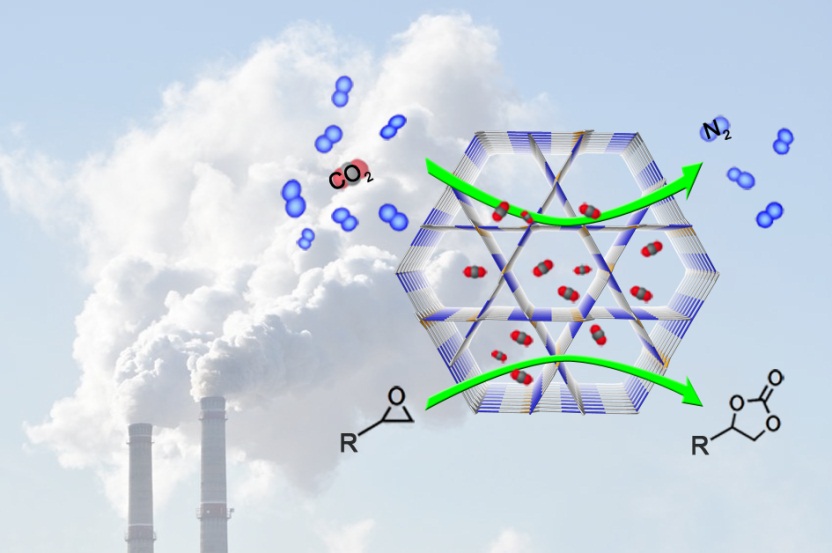Metal-organic frameworks (MOFs) have been served as promising cost-effective and efficient materials for CO2 capture and separation due to their large capacity for the adsorption of gases and their chemical tenability, but development of practically useful MOF materials for CO2 capture directly from power plants remains a challenge.
In a study published in Nature Communication , the research team led by Prof. HONG Maochun from Fujian Institute of Research on the Structure of Matter (FJIRSM) of Chinese Academy of Sciences (CAS) reported an acid-base resistant metal-organic framework, which displayed high volumetric uptake CO2 under ambient conditions and could directly catalyze the chemical transformation of simulated post-combustion gas CO2 into corresponding cyclic carbonates.
To adsorb CO2 effectively under ambient conditions, an unusual MOF material (FJI-H14) with high density of Open metal sites (OMS) and Lewis basic sites (LBS) which can synergistically capture CO2 molecules in the pores have been developed.
FJI-H14 not only showed extraordinary high volumetric uptake of CO2 (171 cm3cm− 3) with high selectivity under ambient conditions but was also highly resistant to water and an acid/base environment. It also could be reused without loss of adsorption capacity and prepared on a large-scale with low cost. Such high adsorption resulted from an unusual synergistic effect from multiple active sites in the pores.
Further chemical conversion of captured CO2 to high-value products is highly attractive; however, development of MOF materials which can catalyze the direct conversion of post-combustion CO2 still remains a challenge. FJI-H14 could directly and smoothly catalyze the chemical transformation of simulated post-combustion gas CO2 into corresponding cyclic carbonates.
This study should be instructive for the design and discovery of more effective and practical MOF materials for the elimination of post-combustion CO2 in the near future.
This work was supported by the Strategic Priority Research Program of the Chinese Academy of Sciences, National Key R&D Program of China, the 973 Program, the National Natural Science Foundation of China, and the Youth Innovation Promotion Association CAS.

Carbon dioxide capture and conversion by acid-base resistant FJI-H14 (Image by Prof. HONG’s Group)
Contact:
Prof. HONG Maochun
Fujian Institute of Research on the Structure of Matter
Chinese Academy of Sciences
Email: hmc@fjirsm.ac.cn